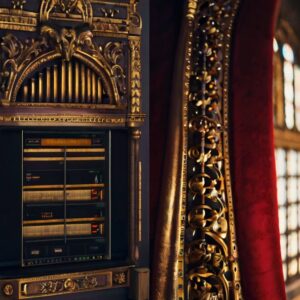Music has always been an important part of the human experience, evoking emotions, telling stories, and commemorating the grandeur of royal events. From the imposing soundscapes of coronations to the delicate harmonies of royal weddings, ceremonial and state music serve as a protagonist in the narrative of royalty.
The Ultimate Royal Playlist

The tradition of coronation anthems, with Handel’s “Zadok the Priest” as an example, goes far beyond simple musical accompaniment, it represents a deep and visceral connection between music, monarchy, and the masses. Originating from the biblical account of the anointing of Solomon, the lyrics of “Zadok the Priest” have become synonymous with the solemn dignity and grandeur of the coronation ceremony. When the choir and orchestra unite in a powerful crescendo, it’s as if the very history and continuity of the monarchy are being evoked through sound. This piece, specifically composed for King George II, has transcended its original occasion to become a timeless symbol of the British coronation ritual, played for over three centuries to herald the moment when the crown physically and symbolically meets the sovereign’s head. The emotional impact of this anthem on those present in the cathedral, as well as on those participating via broadcast around the globe. It serves as a reminder of the past and a celebration of the present and a beacon of stability and continuity, anchoring the monarchy in the hearts and minds of the people across generations. Through “Zadok the Priest”, and anthems like it, the coronation ceremony transforms from a state occasion into a transcendent event, bridging the divine and the earthly, and reinforcing the social and cultural fabric of the nation.
Love Set to Music
Royal weddings indeed offer a platform for showcasing the intertwining of personal choice and national heritage through music, serving as a reflection of the couple’s individual tastes while honoring the traditions that have long been associated with the monarchy. The wedding of Prince William and Catherine Middleton is a prime example of how music can bridge the gap between the past and the present, creating a tapestry of sound that resonates with audiences worldwide. Their selection of music, from the classical strains of Elgar’s “Pomp and Circumstance” to the more contemporary tones of Paul Mealor’s “Ubi Caritas”, illustrates a conscious effort to blend the rich musical legacy of the United Kingdom with the forward-looking perspectives of a modern monarchy. This marriage of musical genres enriches the ceremonial atmosphere and broadcasts a message of unity and progression. The inclusion of Mealor’s piece, commissioned specifically for the occasion, added a personal touch that celebrated not just historical continuity but also the individual love story unfolding at the altar. This careful curation of music, encompassing both time-honored classics and modern compositions, encapsulates the royal couple’s journey into matrimony while also mirroring the evolving relationship between the monarchy and the people it serves. Royal weddings like that of William and Catherine make the statement that tradition can seamlessly coexist with contemporary values, making these moments of celebration more inclusive and emblematic of a nation’s collective identity and its hopes for the future.
The Sound of Sovereignty
State ceremonies, banquets, official openings, or diplomatic receptions, utilize music as a tool of soft power, conveying messages of strength, stability, and continuity. The choice of music at these events is planned to evoke a sense of occasion, respect, and, often, mutual cultural appreciation between nations.
The use of national anthems is the most recognized aspect of these ceremonies, played to honor the visiting heads of state or to celebrate national days. There’s much more beneath the surface. The selection of other music, from military bands to classical pieces and even folk tunes, is aimed at reinforcing the identity and sovereignty of the nation while showing respect to guests. This carefully orchestrated soundtrack serves as an audible handshake, a universal language transcending linguistic barriers.
Music as a Pillar of National Identity
Through these grand events, music transcends its role as entertainment, becoming a cornerstone of national identity and public memory. The compositions associated with the monarchy – be they grand coronation anthems, romantic melodies of royal weddings, or the regal scores of state ceremonies – all weave into the cultural fabric of a nation.
Countries with monarchies aren’t the only ones to harness the power of music in this way. National celebrations and significant public events worldwide use music to reinforce collective identity and shared values, proving that the essence of these royal soundtracks is not exclusive to monarchies.
The Aura of Royalty and Its Sonic Dimensions
The aura surrounding royalty is multidimensional, with music playing a crucial role in its creation and maintenance. These soundtracks for royalty do more than just accompany a ceremony, they elevate it, infusing each gesture and moment with a sense of destiny and continuity that resonates far beyond the walls of palaces and cathedrals.
In an age dominated by digital media, these musical pieces have found a new life. They are no longer confined to the event itself but are shared, replayed, and enjoyed by millions around the globe, amplifying their impact and the global fascination with royalty.
The Continual Evolution of Ceremonial Music
As societies evolve, so too does the soundtrack of royalty. Contemporary composers are increasingly invited to contribute to the repertoire, reflecting current tastes and societal values while respecting the weight of tradition. This evolution signifies the adaptability of ceremonial music and also its enduring relevance.
The music composed for coronations, royal weddings, and state ceremonies does far more than provide a score for the pageantry. It encapsulates the emotions of a nation, celebrates its heritage, and underscores the solemnity and joy of momentous occasions. As we look to future royal events, one thing remains certain: music will continue to play an important role, stirring the hearts and minds of people across the globe, and perpetuating the enchantment of royalty for generations to come.
